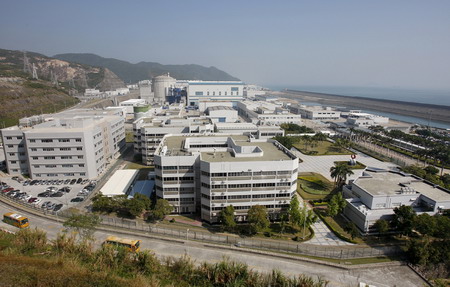Economy
Nuclear reactors deter real estate investors
Updated: 2011-03-28 10:27
(China Daily)
|
 |
|
The nuclear power plant in Daya Bay near Shenzhen. Mounting concern over nuclear safety has left the construction of many homes unfinished near the reactors. [Photo / Provided to China Daily] |
Concern over nuclear safety has left the construction of many homes unfinished, according to the Guangdong-based journal Time-Weekly.
People driving along the coast road at night will see few apartments lit up. Security guards have so little to do that they gather for card games at the single store.
When Daya Bay authorities set up a national economic and technological development zone, thousands of companies invested in the property market but soon had second thoughts.
Cui Yuanxing, the chief consultant at Shenzhen Benshi Asset Management Co, told the journal that Daya Bay is not suitable as a standalone residential community within commuting distance of Shenzhen.
"The nuclear industry has played a negative role in the area's development," the journal quoted Cui as saying.
The power plant, northeast of Hong Kong, has two 944 MWe PWR nuclear reactors, which started commercial operations in 1993.
A total of 1.5 million square meters were set aside for commercial development in the bay area in 2010, an increase of three times year-on-year. Of this, only 800,000 square meters were traded last year.
Wu Qilun, an independent business consultant, said that the prices of residential property near nuclear power stations will fall, especially in areas less than 20 kilometers away.
| ||||
"The nuclear crisis in the island country caused panic so, if there is a nuclear power plant near a Chinese city, the local property market will prove to be unpopular," said Wu.
According to Soufun.com, China's largest nuclear power station, which will cost at least 80 billion yuan ($12 billion), is expected to go into operation in 2014 in Haiyang, in East China's Shandong province, where, traditionally, huge amounts of coal have been used to produce electricity.
According to the website, business development within a radius of 5 kilometers of a nuclear power station is limited, and the station should be at least 10 kilometers from communities of 100,000 people.
The website said that the nuclear power station project had a negative influence on investors. Many local property developers sold their land and left. Sales of some residential dwellings were sluggish.
San Yuefeng, secretary-general at Daya Bay Real Estate Association, told Time-Weekly that low prices and a residence preferential card were being used to encourage sales.
The report quoted San as saying that the average price of an apartment on Daya Bay was 4,748 yuan a sq m in 2010, compared with 20,596 yuan a sq m in Shenzhen.
In October, Daya Bay's local government started a household registration policy to encourage house purchasing.
"People in Shenzhen cannot receive a residence preferential card until they buy an apartment in the bay area," the report quoted Sun as saying.
According to the report, a high-speed railway is expected to be completed in 2012 that will make it easier for residents living near Daya Bay to travel to Shenzhen. The journey will take 10 minutes. Only time will tell if that will be incentive enough to bring in buyers.
E-paper

Rise and shine
The Chinese solar energy industry is heating up following recent setbacks in the nuclear sector
Bombs aim for regime change
CSI, with a twist
Literary path
Specials

Peony express
Growers of china's unofficial national flower are reaching out to europe for help

Tea-ing up
More turning to Chinese tea for investment opportunities like vintage wine

A cut above
The ancient city of Luoyang is home to a treasure trove of cultural wonders.




